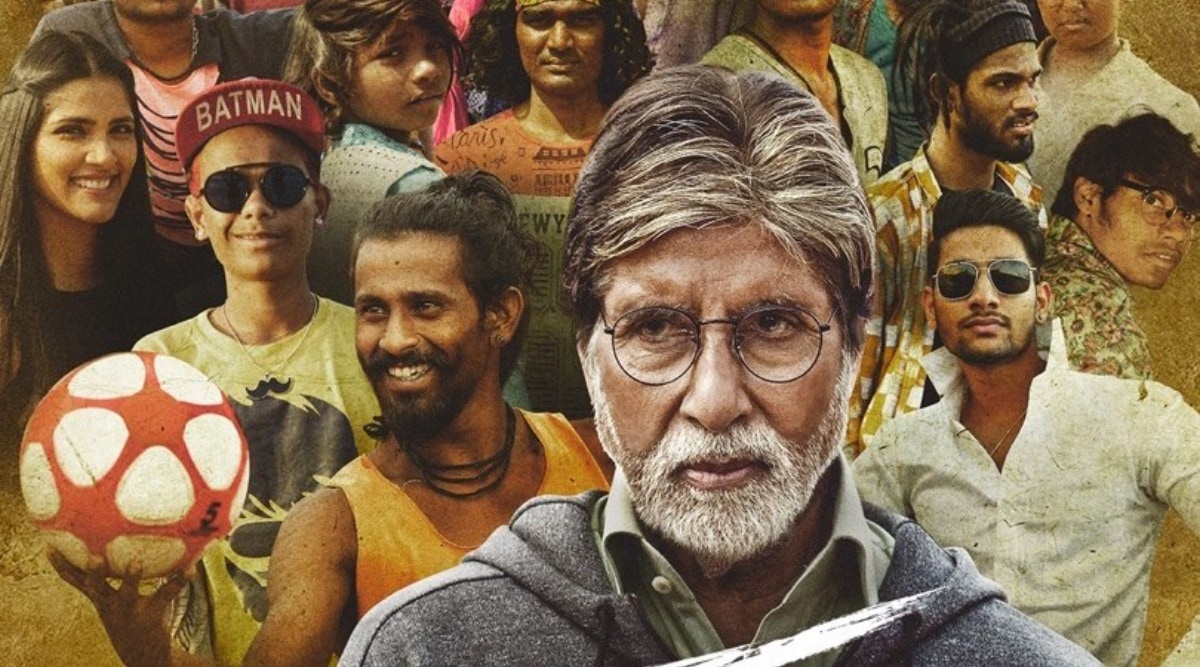 Amitabh Bachchan plays the lead role in Nagraj Manjnule's Jhund.
Amitabh Bachchan plays the lead role in Nagraj Manjnule's Jhund. The inspirational real-life story of the Nagpur-based Vijay Barse who founded Slum Soccer, an NGO doing stellar work with slum kids, is the basis of writer-director Nagraj Popatrao Manjule’s new film, ‘Jhund’. You’d think that there would be no one better than Manjule to ace this kind of film, because of his own background which he uses so authentically in his work. He has given us ‘Fandry’ and ‘Sairat’, two of the most profoundly impactful films on rigid caste divides and inhuman social mores. In ‘Jhund’, the Jai Bhim slogans and the Babasaheb Ambedkar posters which proliferate in a vigorous dance sequence set to Ajay-Atul’s beats, are clear indicators of the Dalit component amongst the slum dwellers. Manjule is also the casting director, so the faces are organic, unlike so many movies in which Bollywood actors go brownface to match their environs.
The gatekeepers literally shoo the residents of the neighbouring slums away from the rarified grounds of St John’s College, because they do not want any proximity with the young people who spend their days doing ‘anti-social’ things like sniffing glue, pickpocketing, chain snatching. The ‘slum kids’ are clearly waiting for a saviour, and who better than veteran sports coach Vijay Borade (Amitabh Bachchan), on the verge of retirement from the local college? He turns his gaze towards this underprivileged section, and beefs them up enough to take on the la-di-dah kids, and to be invited for a world championship league in faraway Hungary.
This motley bunch, all cocky and heartbreakingly worldly-wise despite their youth, is the best part of this film, which makes us work hard for its sweet spots over its infernally long three-hour runtime: you are in danger of falling out of the movie even before you’ve properly got into it. Some of the kids have mothers who work as domestic help in big houses, leaving them to their own devices — picking rags, collecting waste. What’s nice about their portrayal is that even though they have such tough lives, they are not begging for sympathy. All they want is a chance at a better future, and Borade is a perfect beacon.
But the problem is that the film can never quite make up its mind whether it wants to treat Bachchan’s Borade as a hero, or focus the spotlight on the hardscrabble lives of the slum kids and their struggle to beat the tremendous odds they face from a hostile police force, and an equally hostile savarna samaaj that wants to keep them hidden. This yo-yoing effect doesn’t do the film any good, which swings between being a sports film, a bio-pic about an unlikely hero, and a bunch of underprivileged young people on the sporty path to upliftment.
🗞️Subscribe Now: Get Express Premium to access the best Election reporting and analysis 🗞️
The plot is riddled with too many sudden changes of heart. A lone Muslim family is bunged in, to be held up as an example: the man who is a long-time nasty — to his wife and his daughters– comes all over repentant. The police which have been ultra-violent, becomes a facilitator. Borade’s grown son, resentment writ large over his face because of his father’s single-minded involvement with the ‘basti’ kids, leaps over a new leaf.
It’s all so underlined and expository that nuance goes missing. Bachchan does get to play a Vijay with a difference, but his being the wind under the wings of his rag-tag soccer team, as he cheers from the sidelines. However, it is carefully balanced by his getting to deliver a rousing court-room speech, reminiscent of ‘Pink’, with the lawyers looking on admiringly.
The two leads of ‘Sairat’, Akash Thosar and Rinki Rajguru are here, and both are used as ‘types’: the former who hates the leader of the slum gang, Don aka Ankush Masram (Ankush Gedam), the most interesting and detailed of the ‘slumkid’ ensemble, with his wild manbun, hard exterior and soft heart. How dare They raise their head and look Us in the eye?
Rajguru is a girl who plays football beautifully, and is left to swing through bureaucratic hoops to be able to acquire a passport. Hers is the kind of marginalised family which has no ‘kaagaz’, and moments of unexpected hilarity ensue when she and her father ask a prominent member of their village for a ‘pehchaan patra’ (a letter of recognition). How can such a man ‘recognise’ these people who live below his sightline?
Kishor Kadam is interestingly played against type, as Borade Sir’s colleague who is fiercely against this mingling of class and caste, an about turn from his terrific turn in ‘Fandry’ as the head of a dirt-poor Dalit family forced to live on the outsides of the village. In an ethnographic exploration, these characters would have worked better; in a feature film headlined by a superstar, the inherent drama of these people and their situations, goes off-key.
Finally, ‘Jhund’ is an overlong meander, its sporadically alive moments doused in the most generic beats of the sports-as-upliftment movie. The best intentions do not always a good film make.
Jhund movie cast: Amitabh Bachchan, Ankush Gedam, Kishor Kadam, Akshat Thosar, Rinku Rajguru
Jhund movie director: Nagraj Popatrao Manjule
Jhund movie rating: 2 stars
- The Indian Express website has been rated GREEN for its credibility and trustworthiness by Newsguard, a global service that rates news sources for their journalistic standards.



